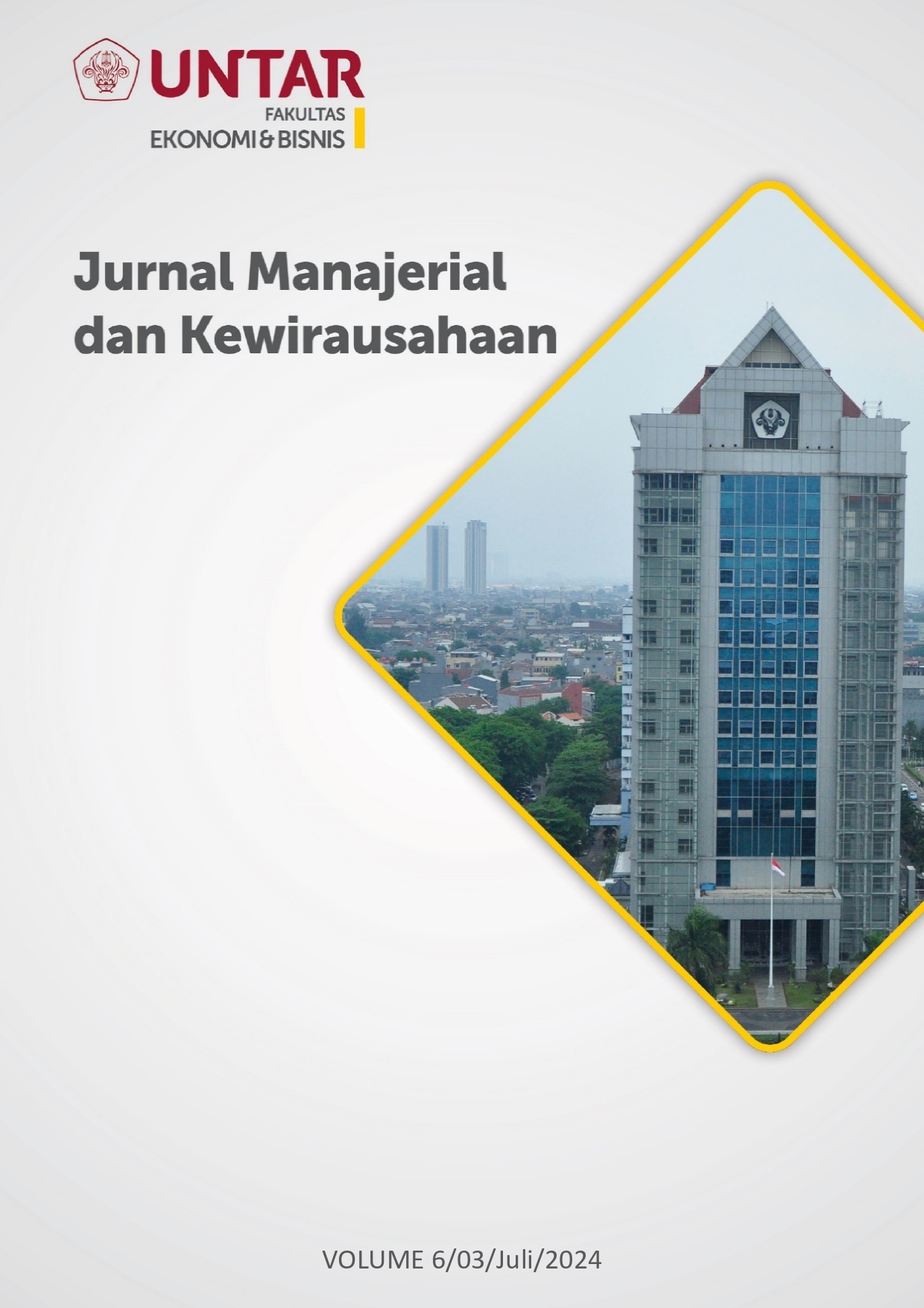Faktor-Faktor Penentu Intensi Mahasiswa Teknik Informatika dalam Technopreneurship
Main Article Content
Abstract
Penting bagi universitas, lembaga pendidikan, untuk menghasilkan lulusan yang mampu bersaing di era Industri 4.0 ini. Seringkali kegiatan kewirausahaan identik “dimiliki” oleh mahasiswa fakultas ekonomi dan bisnis saja, Memiliki latar belakang keterampilan di bidang teknologi informasi, saat ini mahasiswa lulusan informasi teknologi dipandang sebagai jurusan yang mencetak tenaga profesional saja, sehingga masih rendahnya technopreneurship di kalangan mahasiswa teknologi informasi. Oleh karena itu penelitian ini bertujuan untuk melihat pengaruh motivasi kewirausahaan, inovasi, dan efikasi diri terhadap intensi Technopreneurship pada mahasiswa teknik informatika di Jakarta Barat. Penulis menggunakan metode penelitian deskriptif kuantitatif dalam penelitian ini, Selain itu pengumpulan data yang digunakan menggunakan metode cross sectional, Metode sampling yang digunakan pada penelitian ini menggunakan teknik non-probability dengan jenis purposive atau judgment sampling. Sampel dalam penelitian ini sebanyak 124 mahasiswa jurusan teknik informatika di Jakarta Barat, Dalam konteks penelitian ini, PLS-SEM akan digunakan sebagai alat analisis, Hasil hipotesis dari penelitian ini adalah terdapat pengaruh positif dan signifikan antara motivasi kewirausahaan dan Inovasi dengan Intensi technopreneurship pada mahasiswa teknik informatika di Jakarta Barat. Namun dalam penelitian ini tidak terdapat pengaruh yang signifikan antara efikasi diri dengan intensi technopreneurship.
The development of the fourth industrial revolution (Industry 4.0) is driving entrepreneurs to become technology entrepreneurs to face global competition. It is crucial for universities and educational institutions to produce graduates capable of competing in this Industry 4.0 era. Entrepreneurial activities are often associated only with students from the faculties of economics and business. Those with a background in information technology skills, such as information technology graduates, are currently seen as professionals in their field, resulting in a low level of technopreneurship among information technology students. Therefore, this research aims to examine the influence of entrepreneurial motivation, innovation, and self-efficacy on the intention of technopreneurship among computer science students in West Jakarta. The author used a descriptive quantitative research method for this study. Additionally, data collection employed a cross-sectional method, and the sampling method used was non-probability with purposive or judgment sampling. The sample consisted of 124 computer science students in West Jakarta. In the context of this research, Partial Least Squares Structural Equation Modeling (PLS-SEM) will be used as the analytical tool. The hypothesis results indicate a positive and significant influence between entrepreneurial motivation and innovation with technopreneurship intention among computer science students in West Jakarta. However, there is no significant influence found between self-efficacy and technopreneurship intention in this study.
Article Details
Section

This work is licensed under a Creative Commons Attribution-NonCommercial-ShareAlike 4.0 International License.
This work is licensed under a Jurnal Muara Ilmu Ekonomi dan Bisnis Creative Commons Attribution-ShareAlike 4.0 International License.,/p>
References
Adhikara, C., Lasmy, L., Sasmoko, S., & Indrianti, Y. (2019). Technopreneurship Skills of Indonesian Entrepreneurs. Dalam Proceedings of the 1st Workshop on Multimedia Education, Learning, Assessment and its Implementation in Game and Gamification in Conjunction with COMDEV 2018. https://doi.org/10.4108/eai.26-1-2019.2283128
Ainul, Norida, Sudirman, & Mahfuz. (2012). An Analysis of Technopreneurial Intention among Non-Business Student. Dalam 2nd International Conference on Management (2nd ICM 2012), 1-11.
Albashrawi, M. & Alashoor, T. (2020). Entrepreneurial Intention: The Impact of General Computer Self-Efficacy and Computer Anxiety. Interacting with Computers, 32(2), 118-131. https://doi.org/10.1093/iwc/iwaa009
Anning-Dorson dan Nyamekye, (2020). Engagement capability, innovation intensity and firm performance: the role of competitive intensity, Journal of African Business.
Bahadur Ali Soomro, Naimatullah Shah. (2021). Technopreneurship intention among nonbusiness students: a quantitative assessment, World Journal of Entrepreneurship, Management and Sustainable Development, 17(3), 502-514. https://doi.org/10.1108/WJEMSD-10-2020-0129
Bandura, A. (1977). a. Self-Efficacy: Toward a unifying theory of behavior change. Psychological Review, 84.
Bandura, A. (2012). On the Functional Properties of Perceived Self-Efficacy Revisited. Journal of Management, 38(1), 9-44. https://doi.org/10.1177/0149206311410606
Baumol, (2002). Entrepreneurship, innovation and growth: The David-Goliath symbiosis, Journal of Entrepreneurial Finance.
Choudhary, N. (2017). “Investigating entrepreneurial intentions of gen Y”, Doctoral dissertation, Swinburne University of Technology, Melbourne.
Hoque, Awang, dan Siddiqui. (2017). Technopreneurial Intention Among University Students of Business Courses in Malaysia: A Structural Equation Modeling. International Journal of Entrepreneurship and Small, Vol, 4 (July) 2017, pp:1-16 & Medium Enterprise (IJSME)
Khan H, Khan I, Kim Oanh LT, Lin Z. (2020). The dynamic interrelationship of environmental factors and foreign direct investment: dynamic panel data analysis and new evidence from the globe. Mathe Probl Eng. https://doi.org/10.1155/2020/2812489
Kim Lian Chan, J. & Baum, T. (2007). Motivation factors of ecotourists in ecolodge accommodation: The push and pull factors. Asia Pacific Journal of Tourism Research, 12(4), 349-364.
Koe, W.-L., Rahim, M. R. A., & Mahphoth, M. H. (2023). Determinants of Technopreneurial Intention Among University Students: Individual Entrepreneurial Orientation (IEO) as Mediator. Marketing and Management of Innovations, 2, 185–195. https://doi.org/10.21272/mmi.2023.2-17
Kominfo.go.id. 2022. Transformasi Digital UMKM Jadi Prioritas Penguatan Fondasi Ekonomi. 2023. https://www.kominfo.go.id/content/detail/40915/transformasi-digital-umkm-jadi-prioritas-penguatan-fondasi-ekonomi/0/berita
Lee, S. H., & Wong, P. K. (2004). An exploratory study of technopreneurial intentions: A career anchor perspective. Journal of business venturing, 19(1), 7-28.
Prodan. (2007). Technological entrepreneurship: technology transfer from academia to new firms, Thesis Innovation Technology Entrepreneurship & Marketing.
Ryan, R. M., & E. L. Deci. (2000). Self-Determination Theory and the Facilitation of Intrinsic Motivation, Social Development, and Well Being. American Psychologist, 55, 68–78.
Setiawan, J. & Soelaiman, L. (2022). Pengaruh Faktor Psikologis dan Keterampilan terhadap Keberhasilan Wirausaha Wanita. Jurnal Muara Ilmu Ekonomi dan Bisnis, 6(1), 85-94. https://doi.org/10.24912/jmieb.v6i1.15974
Soelaiman, L., Herwindiati, D. E., & Payangan, O. R. (2023). Empowering The Role of Generation Z as Agents of Change through TechnoSociopreneurship. Seybold Report Journal, 18(9), 74-90. https://doi.org/10-5110-77- 1044
Tifany, Nur Aida. (2017). Pentingnya Technopreneur untuk Majunya Industri di Indonesia.
Urban, B. (2010). A gender perspective on career preferences and entrepreneurial self-efficacy. Journal of Human Resource Management, 8(1), 1-8.
Wardana et al. (2020). The impact of entrepreneurship education and students' entrepreneurial mindset: the mediating role of attitude and self-efficacy, Heliyon.

